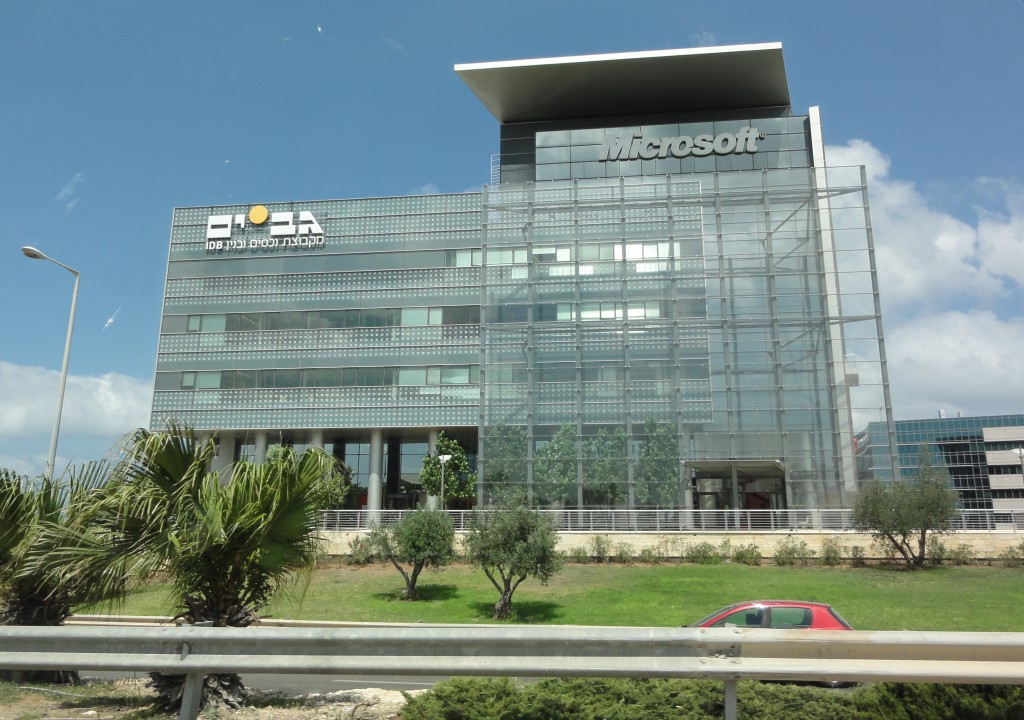Israel’s astounding start-up success has led to an exodus to California, where the titans of tech compete for Israeli talent. Is it “brain drain,” or something much better?
It’s unusually muggy for Palo Alto, but I don’t mind. Dressed in typical California summer clothes—rainbow flip-flops, high-waisted jean shorts, a casual t-shirt—I’m comfortable despite the heat. I’m in a good mood too. The sky is a deep, cloudless blue, and the palm trees sparkle in the sun.
I’m listening to my iPhone 5s, which is appropriate, because this is Silicon Valley, and the phone is made by Apple, headquartered in nearby Cupertino. It’s a two-mile walk from where I’m staying on the Stanford campus to downtown Palo Alto, so I’m a little bored and start fiddling with my phone. I check my Facebook newsfeed—also appropriate, because the social media behemoth is based just four miles away, in the neighboring town of Mountain View.
I look up and realize I’m pretty close to my destination. I switch over to Google Maps (Google is also located in Mountain View) and check how far I am. It should be coming up pretty soon here. On the left side of the street, right? Just before the Apple Store? Yup. Google Maps confirms it. I pass the Stanford Theatre, which shows classic films; a flower shop that transforms into a hookah lounge at night; a Round Table Pizza; and here it is: Oren’s Hummus. As usual, there’s a line out the door.
The restaurant was founded in 2011 by Israeli entrepreneur Oren Dobronsky, and it serves some of the best Israeli food outside of Israel. The pita is freshly baked and bears little resemblance to the dry, brittle stuff you get at Safeway. Many of the ingredients are imported directly from Israel. I’m escorted inside and given a complimentary bowl of pickled cabbage. The restaurant is small and packed. Hebrew intermingles with English, since numerous Israelis are here, attesting to the restaurant’s authenticity.
Although Silicon Valley doesn’t attract many tourists, it’s not unusual to hear Hebrew spoken around here. There are over 100 Israeli tech companies in the area, and with them, a sizable population of expatriates. There’s no official data, but somewhere between 50,000 and 200,000 Israelis live here, between two and eight percent of the total population of the area; it’s a huge percentage of the 500,000-800,000 Israelis living in the U.S.
Why are so many of them here? Is their emigration a problem for Israel? Is Israel losing precious high-tech entrepreneurs and expertise to the United States? Are Israel’s fears of a worsening “brain drain” warranted?
Considering the strength of Israel’s homegrown tech industry, it does seem odd that so many Israelis have come to the Bay Area. Israel’s version of Silicon Valley is referred to as “Silicon Wadi,” after the Arabic word for “valley.” Stretching up Israel’s central coastal plain from Tel Aviv to Haifa, it’s ranked as the world’s second-best startup environment. It has more companies listed on the NASDAQ exchange than Africa, Germany, France, the Philippines, Japan, Russia, Singapore, Korea, and India combined—the most startups per capita anywhere in the world.
So, why do Israelis leave?
They aren’t leaving because of a hostile environment. They are less pushed out then pulled in. It is not that Silicon Wadi is bad, but that Silicon Valley is better. Silicon Valley, after all, is the world’s best startup environment; the number one, the original. Companies located in Silicon Valley have access to more funds and more talent, not to mention better access to the largest and most important consumer market—the United States. For the most part, Israelis come here for one reason: To improve and expand their companies.
Put simply, part of what makes Silicon Wadi so great also limits it: The sheer number of startups competing for venture capital (VC) funding makes it difficult for any company to hit it big. Israeli venture capitalist funds just don’t have the money to invest in every good idea. They tend to stick to investing in brand-new startups in the first round of funding (referred to in the industry as the “seed stage”). After that, foreign companies swoop in with the big bucks. As of 2012, these foreign VCs were providing three-quarters of the money raised by Israeli startups.
But it’s a lot easier to get that money straight from the source. So Israelis head for the United States.
Noam Bardin is among them. Bardin grew up in Israel and attended Hebrew University in Jerusalem. He is now CEO of Waze, an Israeli navigation app that uses crowdsourcing to tell you which routes have the most traffic, where the closest or cheapest gas station is, or where police have set up a speed trap. Though it was developed in Israel, the startup moved to Palo Alto soon after its creation. The move paid off, to say the least: In June 2013, Google bought Waze for almost one billion dollars.
In a popular post on his LinkedIn page, Bardin highlighted the reasons foreign startups should move to Silicon Valley. First among them, of course, is money.
You will raise more money, at a better valuation, from better investors. Silicon Valley is a unique place. The odds of raising money from a Valley firm if you are based in a foreign country like Israel are very low…. In addition, the U.S. valuations are higher and you will raise more money for less of the company.
In other words, Silicon Valley VCs not only have more funds at their disposal, but tend to be more generous with those funds than their Israeli counterparts. For an Israeli startup that wants to hit it big—as in $1 billion big—Silicon Valley is the only place to be. In the 1840s, people came to California to look for gold. The same is true in the 21st century.
Ilan Twig, an Israeli entrepreneur and engineer, agrees that the Valley is special. Twig has been in Silicon Valley for eight years. Relocated to the United States by the software company Mercury Interactive, Twig moved on to work for a startup, then founded his own company. Together with his business partner Ariel Cohen, Twig created StreamOnce, an app that allows workers to access all their business communications from one place. The startup raised $1.4 million in funding, and after only one year was acquired by software company Jive for around $10 million. Twig believes StreamOnce “could not have been funded in Israel and could not have been successful in Israel.”
While it is obviously essential to success, funding is not the only reason Israelis come to Silicon Valley. Israel is a tiny country of only eight million people. That market size—only 2.5 percent of its U.S. equivalent—doesn’t present a lot of opportunities for expansion. Eyal Ophir, an Israeli working at Yahoo, confirmed that this is a major reason Israeli companies move to the Valley.
It feels like most of the big established companies are here, mostly because the audience is bigger, and the market is bigger…. I know a lot of Israeli companies that, once they get to a certain size, they come here. Because this is where all the market opportunity is; whether they’re acquired or whether they’re chasing a larger market.
Some companies do attain success in Israel. But success in Israel does not indicate much about a company’s potential to succeed elsewhere. To secure a large buyout, a startup must prove itself in the U.S. market. To steal a line from Frank Sinatra, if you can make it in the U.S., you can make it anywhere. That isn’t the case the other way around.
If a startup stays in Israel, it can only get so big. But if it moves to Silicon Valley, it has 318 million people it can target. It can keep expanding almost without limit. And once a company has acquired an American consumer base, it has the momentum to go global. That is the model followed by Facebook, Instagram, Dropbox, Snapchat, eBay, Hewlett-Packard, Netflix, LinkedIn, Twitter, and so on. It’s the new American dream.
But this is not, at least on the surface, quite so wonderful for Israel. The country seems to be losing its most brilliant and ambitious citizens to the United States. Journalists, politicians, and academics have all pointed to a brain drain crisis in Israel. As a result, the country is worried. The tech industry is an integral part of its economy, so a brain drain does not bode well for Silicon Wadi.
Or does it?
There’s no doubt that the tech industry is very important to the Israeli economy. In recent years, it has been Israel’s fastest growing economic sector, at over eight percent annually. And it does seem to be a major factor in the steady growth of the rest of the economy. Israel’s GDP (PPP) has risen in a linear fashion over the past five years in tandem with its tech industry: From $203 billion in 2009 to $264 billion over the past year.
In the face of such statistics, Israeli anxieties about a brain drain in the high-tech sector are certainly understandable. But there’s a good case to be made that this “loss” of smart, entrepreneurial Israelis is not a loss but a gain.
First, the “loss” of brainy Israelis tends to be impermanent. Many Israelis return home after a couple of years in California. In 2009, 15,900 Israelis left, but 11,000 returned home. In 2010, 15,600 left and 10,200 came back. In 2011, 16,200 left and 9,500 returned. Twig believes that “most Israelis think about coming back,” and he himself intends to return in three or four years. Another Israeli I talked to described Israel as home, and is certain he will return. “I know that my family and my place is really in Israel,” he said.
When these Israelis come back to Israel, they bring the connections, knowledge, and skills necessary to build successful companies back with them. Even those still in the U.S. can help the Israeli tech sector grow. Ophir, for example, has worked informally to strengthen ties between the two countries’ tech industries.
I have friends in Israel; and I can share, I can help them. I’ve done that in the past. I’ve helped them become connected with people in Silicon Valley; contacts that were useful for them or helpful to them in growing their own companies. Being here has let me do that for them.
With the help of expats, tech workers who remain in Israel can found better companies. True, some of those companies will also end up in the U.S. But before they move, they are in Israel, where they contribute to the economy, provide jobs, and attract foreign investors.
It’s a cycle: A bigger, more established company moves to the U.S., while a young upstart takes that company’s place in Israel. When the young upstart is no longer so young or such an upstart, on it goes to California, and a new Israeli startup rises to take its place. This is, of course, a simplification, but the general principle remains true: Silicon Wadi and Silicon Valley are in a mutually beneficial, rather than parasitic, relationship.
When a startup is “moved” to Silicon Valley, moreover, it rarely moves in its entirety. Usually, only the headquarters is transferred. Once in California, sales, marketing, and management employees interact with venture capitalists, journalists, and other businesspeople in order to get the company noticed. But the “guts” of the organization—research and development (R&D)—stays in Israel.
An R&D branch improves on existing products and develops new technologies. It keeps a company relevant. And R&D tends to stay in Israel because R&D there is exceptionally strong. The number of multinational tech companies with R&D centers in Israel attests to this. Among them are Intel, Google, GM, Microsoft, IBM, Facebook, Cisco Systems, Sears, Oracle, and Apple. In Israel, they can recruit young men and women fresh out of the Israel Defense Force’s elite intelligence and computer science units. These talented engineers have received an education on par with that provided by MIT or Stanford.
In 2012, Shuly Galili founded UpWest Labs, a tech accelerator that brings Israeli startups to Silicon Valley; she said in an interview with the Times of Israel that “the ideal formula for an Israeli start-up is to have a sales and marketing office in the U.S., with their R&D facilities in Israel.” This formula is very common. Since the UpWest program began, almost all of the Israeli startups involved have kept their R&D branches in Israel. When Noam Bardin brought Waze to Palo Alto, for example, only ten Waze employees accompanied him. The other 70 employees—half of them part of the R&D department—stayed in Israel.
Galili says that this “split approach” allows companies to be as successful as possible, maximizing access to funds and markets along with a company’s capacity for innovation. This is not just good for the company, but also for Israel. “Once Israeli startups break into the market in the U.S.,” he said, “they expand and hire even more people in Israel. We’ve seen it happen with companies like Waze and many others.”
Indeed, after being acquired by Google, Waze grew by 20 percent. Its employees got about $1 million each. Waze plans to double the size of its team in Israel over the next year. Clearly, the success of Waze and the “split approach” has directly benefited Israel. This seems to indicate that there is not so much a brain drain in the Israeli tech industry, but “brain circulation.”
Yet wouldn’t it be even better for Israel if Israeli companies just stayed put? If, rather than spending a few days in Israel every month, people like Bardin lived, worked, and paid taxes in Israel?
Probably. But given that the hard realities of the tech industry are unlikely to change anytime soon, it just isn’t feasible. Israeli companies are drawn to Silicon Valley because they have the greatest potential for success there. They limit themselves if they stay home. If what’s good for Israeli tech companies is good for Israel, then we need to accept that what’s good for Israeli tech companies is to go to Silicon Valley.
And it’s important to note that this circulation of people, products, and ideas between Israel and the U.S. is also good for the U.S.-Israel relationship. The everyday interactions between Israelis and Americans in Silicon Valley—whether at a networking event, a business meeting, or Oren’s Hummus—strengthen the bonds between the two countries. After all, you cannot love what you do not know; Americans in Silicon Valley are getting to know Israelis. The Valley, after all, has long been described as a melting pot.
That certainly holds true for the ways Israelis and Americans interact here. The Silicon Valley Jewish Film Festival is run by an Israeli. Regular lectures on various personal and professional topics, called Zang Talks, bring together Israelis and American Jews. Twig has been asked about Israel everywhere, from a bus to the airport to the dentist’s office; Oded Breiner, the Chief Technology Officer of the startup Robin Labs, says that his American friends ask him about a range of topics, from Operation Protective Edge to life in Tel Aviv to what the heat in Israel is like; he says that he tries to “market Israel as much as I can.” And, of course, Israelis and Americans work together in Silicon Valley. Nearly every American startup in the Valley has Israelis on its payroll, and Israeli startups that move to California usually hire Americans.

A presentation by Dror Cohen of Waze at the 2012 Frontiers of Interaction Conference. Photo: Frontiers of Interaction / flickr
This collaboration extends into the political realm. California and Israel have a very strong economic connection: Trade between them totals $4 billion a year. California Governor Jerry Brown and Israeli Prime Minister Benjamin Netanyahu met this year to encourage business cooperation, signing a pro-business pact this past March. “What a wonderful furthering of the deep connections Israel has with America, and California in particular,” Governor Brown told the audience at the signing event, which included 150 Israeli and American politicians, tech-industry figures, and VIPs.
No other country has this kind of agreement with California; and the flow of companies, people, and ideas between the two countries ensures that the strength of the U.S.-Israel partnership remains strong.
Israelis leaving Israel for Silicon Valley, taking their knowledge, talent, and ambition with them, might seem like a rotten deal for Israel. But there’s every reason to think that it isn’t. In fact, this trend is economically, intellectually, and culturally beneficial to Israel. It’s also beneficial to the United States, and thus brings America and Israel closer together. Rather than connecting over something as amorphous as “shared values,” we connect over the rapid growth of cloud computing, the risks inherent in building B2C software, the difficulty of getting Series A funding, and, of course, our appreciation for Oren’s Hummus.
![]()
Banner Photo: Ed Schipul / flickr








